Patrick O'Shaughnessy's Blog, page 10
April 2, 2019
Brian Singerman – Investing in the Best Founders – [Invest Like the Best, EP.127]
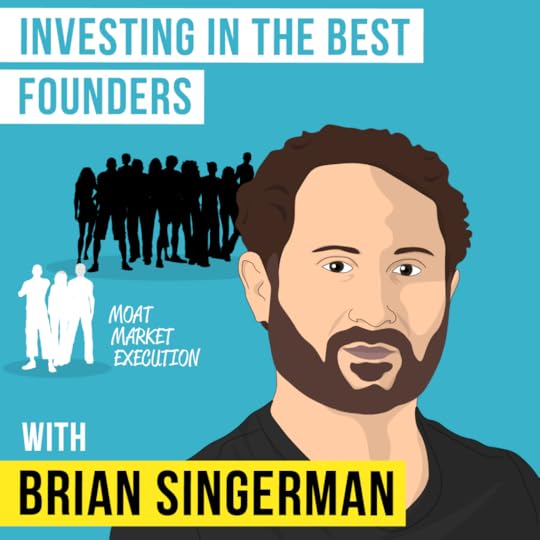
My guest this week is Brian Singerman, a partner at the
venture capital firm Founders Fund. Founder’s Fund is widely considered one of
the top VC firms and its partners are known to have diverse investment
strategies.
Brian invests across industries and focuses on backing
exceptional founders. You’ll hear right off the bat that he cares about moat,
market, and strong execution. I love his point that the only way to become a
good investor is to do a lot of investing. He describes himself an investor who
uses his gut a lot, which took me a while to get used to in our conversation.
But I have to say that at the end of this episode I felt refreshed and
generally excited to keep putting in reps in my own way, both in the podcast
and the quant research settings. I hope you enjoy.
For more episodes go to InvestorFieldGuide.com/podcast.
Sign up for the book club, where you’ll get a full investor
curriculum and then 3-4 suggestions every month at InvestorFieldGuide.com/bookclub.
Follow Patrick on Twitter at @patrick_oshag
Show Notesd
1:28 – (First Question) – What Brian looks for when
evaluating companies
2:38 – What a moat looks like in investing
3:11 – Most memorable initial moat
4:17 – How he evaluates a potential market
5:28 – Attributes they look for in founders
6:24 – Most significant technological changes and how they
have impacted his investment strategy
8:57 – The sourcing of his deals
13:00 – Qualities he likes at various stages of deal sourcing
13:46 – How he evaluates the teams he may fund
15:17 – His take on the pricing landscape for deals
16:13 – How he allocates his time as a board member
17:16 – Thoughts on long term stock exchange
18:26 – How much research does he do on an industry in order
to stay on top of his investments
20:10 – Outside information he follows
21:20 – Other
investors he’s learned a lot from
23:12 – What values does Peter Thiel instill in the partners
24:05 – Process of StemCentrics
26:03 – Other places holding his interest today
26:57 – His interest in e-sports
31:44 – Interactions with LP’s
32:51 – What they look for in recruiting new partners
34:32 – How geography impacts the opportunity for new ideas
36:24 – Opportunities in public companies and other
investment types
37:57 – Aspects of overseeing a startup venture
39:26 – Kindest thing anyone has done for him
March 26, 2019
Michael Mauboussin – The Four Sources of Alpha – [Invest Like the Best, EP.126]
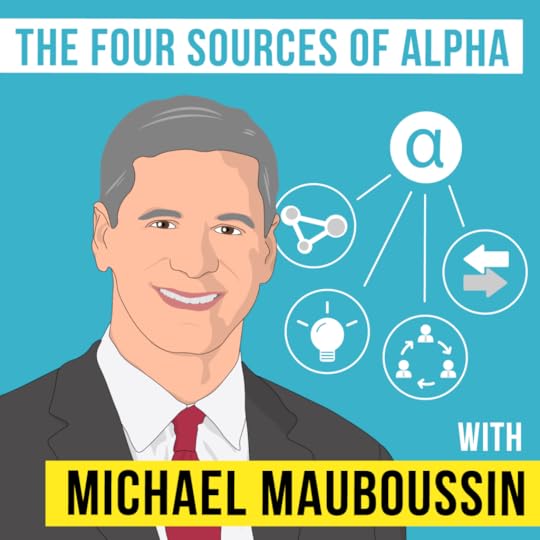
My guest this week for the third time is Michael Mauboussin.
If there is a major question about markets and investing, Michael has usually
written one of the best pieces of research on that topic. Today’s conversation
is a mix of several of his research pieces, but focuses on the sources of
alpha.
The framing of the conversation is the brilliant question “who is on the other
side” of a given trade. If you are buying, who is selling, and why? Knowing the
answer to this question is one key to understanding where excess return comes
from. As is usual with Michael, we also explore tons of other interesting ideas
that will serve as food for thought. Please enjoy.
For more episodes go to InvestorFieldGuide.com/podcast.
Sign up for the book club, where you’ll get a full investor
curriculum and then 3-4 suggestions every month at InvestorFieldGuide.com/bookclub.
Follow Patrick on Twitter at @patrick_oshag
Show Notes
1:23 – (First Question) – An outline of the syllabus for the
course he teaches
4:02 – What are smart people missing when it comes to
decision making
5:33 – Why Michael went down the path of defining major
investing concepts
7:41 – On the
impossibility of informational inefficient markets
9:14 – Beware behavioral finance
12:03 – What are the behavioral errors that people can take
advantage of in a trade
15:14 – Timing opportunities
17:25 – Modest Proposal Podcast Episode
17:47 – Where the analytical edge comes from
21:16 – Is there an advantage to exhibit time arbitrage
23:53 – Technical arbitrage
29:34 – What impact do flows into ETFs play on the market
32:25 – Informational edge and how you source that edge
36:39 – Biggest changes that he has seen on the buy side
43:18 – How would
Michael apply this as a sports GM
48:35 – His views on stock buybacks
51:02 – The
Outsiders: Eight Unconventional CEOs and Their Radically Rational Blueprint for
Success
52:55 – EBIT to EBITDA paper
54:43 – What
Does a PE Multiple Mean?
59:28 – The concept of benign myths
1:02:06 – What the future holds of Michael
1:04:17 – The
Myth of Capitalism: Monopolies and the Death of Competition
March 19, 2019
Annie Duke – Wanna Bet? – [Invest Like the Best, EP.125]

My guest this week is with Annie Duke, and the topic of our
discussion is how to improve decision making.
We break decisions down into their component parts: values,
beliefs, decisions, randomness, and outcomes. After diving into each, we
discuss how to make better decisions, how to work in group settings, and how to
harness power of tribes and identity to improve our behavior.
Annie has thought about this as much as anyone, and her various
tricks for getting us to think in probabilities and to stop evaluating
decisions based on outcomes that have been tainted by randomness will be useful
for anyone listening.
Please enjoy.
For more episodes go to InvestorFieldGuide.com/podcast.
Sign up for the book club, where you’ll get a full investor
curriculum and then 3-4 suggestions every month at InvestorFieldGuide.com/bookclub.
Follow Patrick on Twitter at @patrick_oshag
Show Notes
1:23 – (First Question) – Why people don’t take the best
investing advice
2:11 – Investing tribes
4:21 – Jay Van Bavel twitter
6:34 – Rule setting as a way of crafting an investment
strategy
11:13 – How much control do we have in choosing our
values
15:52 – Anatomy of a decision
19:28 – Her concept of resulting
26:47 – How beliefs
impact your decision making
34:28 – Tact’s for making the best decision
42:40 – Ego and decision making
47:06 – People who are exceptional at changing their
decision making
48:18 – How often do people who change their decision
making, stick with the rules of the game
50:07 – Finite
and Infinite Games
50:28 – Psychology of making decision that involves other
people
59:20 – Never close
doors on other people
1:01:57 – Best decision that Annie made
1:04:24 – Kindest thing anyone has done for Annie
March 12, 2019
Michael Mayer – Pseudonymous Social Capital and Bottomless Coffee – [Invest Like the Best, EP.123]
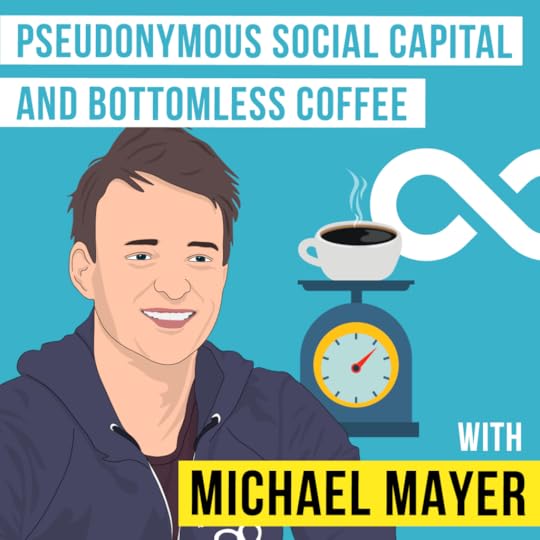
My guest this week is unique and so requires a short story.
I met our guest Michael Mayer because of twitter. I followed
and enjoyed one of several pseudonymous accounts that he maintains to
experiment with ideas. His various accounts have wide followings.
I think many of the best accounts on twitter are anonymous or
pseudonymous, and I’ve always made a point to get to know the ones I like best.
As it turns out, Michael was also an entrepreneur. He’d been building a new
company and was raising a small amount of outside capital.
I didn’t invest personally, in part because he raised it so
quickly after I spoke with him. Ever since, I’ve gotten to know him better and
followed his company, Bottomless, with interest. You know that I am always
hyper transparent about any potential conflicts of interest, so its worth
noting that while I am not an investor in this company, I expect to be at some
point in the future.
The topic of our conversation is both his social media
activity and his company. I am a coffee fanatic, and the problem he is solving
is one I live. I order a weekly bag of coffee beans but I often have too much
coffee or run out. Bottomless solves this by shipping you a simple scale which you keep wherever
you store your coffee, connect to your wifi, and set your bag of coffee
on. It automatically orders new coffee for you at the right time. Thus the
name: Bottomless. If you like the conversation, check out bottomless.com
With this podcast, all I’m really trying to do is find, meet,
and learn from interesting people. Michael certainly qualifies. I hope you
enjoy this unique episode.
Show Notes
2:06 – (First Question) – Why he writes under a pseudonym
online
2:58 – Positive impacts of writing this way
3:45 – His background
5:02 – Habits he improved upon
7:03 – Where did his exploration into technology and
start-ups come from
7:33 – Algorithms
to Live By: The Computer Science of Human Decisions
10:32 – Elements of business that interest him most
13:26 – Building social capital vs the current state of
education
17:06 – What information does he like to consume
18:17 – Zero
to One: Notes on Startups, or How to Build the Future
18:34 – Jerry Neumann blog Reaction Wheel | Podcast episode
18:39 – Kevin Simler’s blog Melting Asphalt| Podcast Episode
21:01 – Why the current education system is busted
22:54 – Formation of his business
24:04 – Importance of making things legible
25:54 – On demand delivery vs subscription business models
30:16 – Early day in developing the scale for his business
33:50 – What he learned about coffee roasters
35:29 – thoughts on supplier power
36:17 – The customer relationship
39:50 – Best objections to his business
41:58 – Biggest operational/emotional challenges
42:56 – Best moment
44:39 – Time at Y combinator
46:28 – His unique co-founder story
49:47 – Marketing strategies and acquisition costs
51:37 – The idea of a commercial loop
53:27 – Discarded ideas, such as spaced repetition social
networks
57:38 – Having a long-term plan vs reformatting a business
into success
1:00:35 – What works on twitter based on his experience
1:03:09 – Most controversial opinion
1:05:59 – Kindest thing anyone has done
March 5, 2019
The Future of Politics with Peter Zeihan [Invest Like the Best EP.123
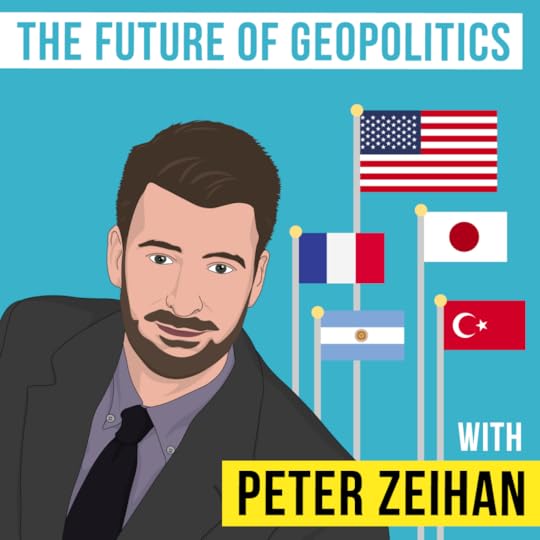
Peter is a geopolitical strategist who combines expertise in demography, economics, energy, politics, technology, and security to assess an uncertain future. Before founding his own strategy firm, Peter helped develop the analytical models for Stratfor, one of the world’s premier private intelligence companies.
I came across Peter via his books the Accidental Superpower and the Absent Superpower. We discuss America’s changing place in the world and four additional countries poised to do well in the future. Spoiler alert: he believes the U.S. is particularly well positioned.
While we don’t discuss equity markets per se, all of what we talk about will obviously impact companies across the world for the remainder of our careers. Please enjoy our conversation.
Show Notes
1:32 – (First Question) – His model of the world
4:05 – What makes for a strategically advantaged country
5:35 – History of the Bretton Woods agreement and the order that it created
8:47 – The security apparatus that has made globalization of manufacturing possible
12:04 – The US’s pullback from being the naval police of global trade
12:08 – The Absent Superpower: The Shale Revolution and a World Without America
14:57 – How energy has played into America’s disinterest abroad
21:52 – Moving towards global disorder
24:55 – Characterizing factors that will impact countries in any collapse
27:38 – How this manifest in physical conflict
32:44 – How the new world order will end the ease of innovation we are accustomed to today
34:13 – What gets the US to reengage before this new world order
38:08 – Demographics that make a country prepared for this, Japan as an example
40:57 – A look at China
43:59 – What the story is about Argentina
45:52 – How North America fares based on their geography and relationships
49:50 – The trader wars that are currently ongoing
52:17 – US political system
56:15 – Most important policy issues moving forward
58:27 – His view on American infrastructure
1:00:33 – Technologies that interest him the most
1:02:55 – What he is watching most closely in his research, starting with media
1:05:59 – What are and should be the countries of the future
1:06:55 – Kindest thing anyone has done for Peter
1:07:32 – Favorite places he’s been
February 26, 2019
Michael Kitces – The Past, Present & Future of Financial Advice – [Invest Like the Best, EP.122]
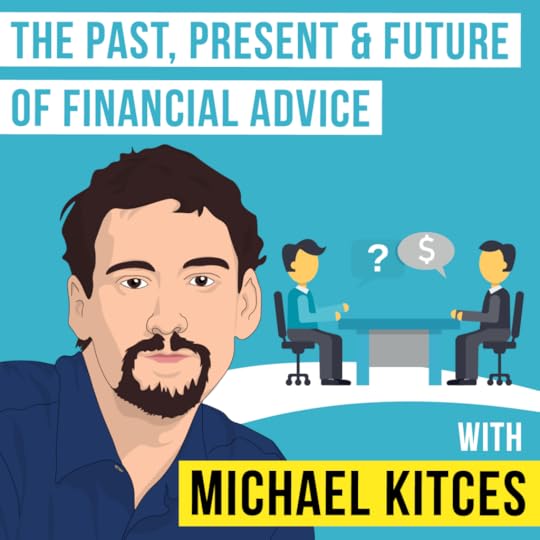
My guest this week is Michael Kitces, who is one of our
industries go-to experts on all things financial advise and financial planning.
We discuss the past, present, and future of financial
advise, financial technology, and investing. If you are a financial advisor or
use one, this conversation is full of great history and perspective. Please
enjoy.
For more episodes go to InvestorFieldGuide.com/podcast.
Sign up for the book club, where you’ll get a full investor
curriculum and then 3-4 suggestions every month at InvestorFieldGuide.com/bookclub.
Follow Patrick on Twitter at @patrick_oshag
Show Notes
1:08 – (First Question) – History of financial
planning/advice model
5:26 – Fee changes in the 1970’s
10:01 – The start of the AUM model
10:44 – Value proposition for financial advisors beyond
trading vs robo-advsiors
11:49 – Why
Robo-Advisors Will Be No Threat To Real Advisors
18:20 – Why are humans still dominating the space
23:58 – Future of advisor fees
32:50 – Viability of the human driven flat fee model
37:50 – The dominance of flat fee models
43:13 – What services are financial advisors offering to
justify their fees
47:17 – Dimensions to divide potential customers
52:20 – Exciting updates on the investment side that will
help differentiate managers
55:37 – Any investment function beyond the basics that is
intriguing to him
58:45 – Most interesting problems to be solved on the
investing and non-investing sides
1:04:52 – Advice for young advisors
1:09:24 – How does he invest his own money
1:11:31 – Kindest thing anyone has done for Michael
February 12, 2019
Alex Danco – Scarcity, Abundance and Bubbles – [Invest Like the Best, EP.121]
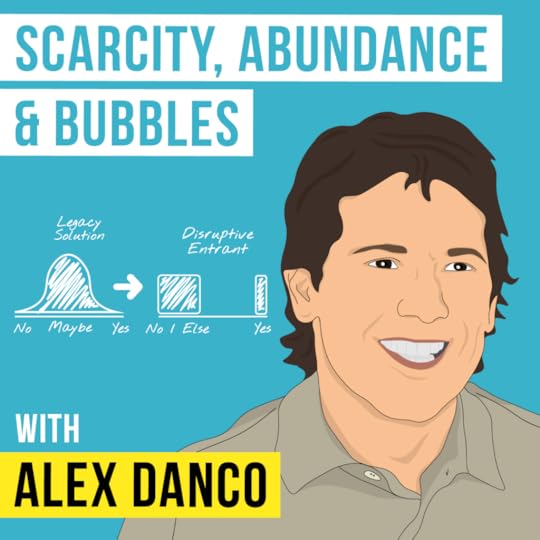
Show Notes
1:15 – (First Question) – A look at his day job on the
discover team
2:20 – 40
problems doc
4:27 – How companies get on the list and the turnover
5:21 – Hardest problem they are looking at…housing
11:37 – The investment component that fixes housing
15:35 – Where we are in the technology cycle in the view of
abundance vs scarcity
20:54 – Change in distribution and the business vs utility
business idea.
28:40 – Bifurcation of small and larger businesses
32:48 – New forms of scarcity today
38:31 – The trend of massive company incumbency
41:07 – The utility of bubbles
49:08 – His favorite bubble
51:18 – Challenges and nuances of bubbles
53:35 – Zero
to One Notes on Start-Ups, or How to Build the Future
1:02:22 – Future for VC funding in Silicon Valley
1:04:07 – Advice for business builders
1:08:23 – The Three True
Outcomes
1:13:04 – His background in biology and innovation in that
space that is coming
1:19:46 – Company examples that are of interest to him and
that encapsulate his way of investing
1:24:56 – Kindest thing anyone has done for Alex
February 5, 2019
Keith Wasserman – Real Estate Investing – [Invest Like the Best, EP.120]

Show Notes
0:00 – (First Question) – Their interest in apartments and
mobile homes as investments
1:29 – The returns spectrum for different classes of real
estate
3:01 – His early entrepreneurial ventures and the start of
Gelt
6:42 – Don’t be afraid of negotiating
7:30 – Going through early deals in real estate
10:54 – How he determines when it’s time to sell a property
13:10 – How do they think about taxes in their investment
offerings
15:54 – Depreciation strategies in real estate investing
17:24 – The evolution of the types of real estate properties
they’ve invested in
20:38 – Most important factors when evaluating a building to
invest in
22:47 – Barriers to entry
24:38 – Changes in his cost of capital
27:47 – Cost of debt and deciding how much to put into a
building
29:29 – A look at the competition
33:48 – Effective marketing strategies
36:04 – How demographics impact their strategies
38:08 – The co-living space
39:30 – Cloud kitchens and how he would invest in these
45:07 – How autonomous vehicles will impact real estate
46:49 – Pros and cons of developing new properties vs buying
existing ones
48:56 – Early stage investing interest
52:45 – Favorite business/entrepreneur story
54:06 – Advice for younger entrepreneurs
56:08 – Kindest thing anyone has done for Keith
January 29, 2019
Alex Mittal – Early Stage Investing – [Invest Like the Best, EP.119]

My guest this week is Alex Mittal, co-founder of Funders
Club. Following past guest Jeremiah Lowin, Alex is my second elementary school
friend to appear on the podcast—a trend I hope continues.
Funders club is a unique venture firm, because it is build
around a network of investors and entrepreneurs who submit deals for
consideration and invest together. But as you’ll hear, Alex and his co-founder
Boris aren’t just building an open platform for early stage investing: they
also then take a very traditional venture approach, making investing decisions
themselves when it comes to building a centralized portfolio.
Our conversation is about what Alex has learned investing in
almost 300 early stage companies over the past 7 years.
Please enjoy.
For more episodes go to InvestorFieldGuide.com/podcast.
Sign up for the book club, where you’ll get a full investor
curriculum and then 3-4 suggestions every month at InvestorFieldGuide.com/bookclub.
Follow Patrick on Twitter at @patrick_oshag
Show Notes
1:30 – (First Question) – Inception of the Founder’s Club
1:36 – Jeremiah
Lowin Podcast Episode
3:59 – How the process of their platform works
5:40 – Role of the network in Founders Club setup and
success
8:26 – What he has learned from all of the data he has
access to
16:00 – Early stage investing and finding the sweet spot
22:17 – What makes a really intriguing bad idea
25:23 – Why he remains so excited about Ethereum
31:18 – More bad ideas
31:55 – Apoorva
Mehta on How I Built This Podcast
37:15 – Thoughts on retail and logistics and how they fit
his Venn diagram of boring and crazy
43:13 – Chip and electronic design
45:47 – Companies that are not just increasing efficiencies
but actually making foundational changes
45:54 – Energy
and Civilization: A History
52:34 – What does he look for in founders
55:26 – Pivot or
Fail
57:05 – Kindest thing anyone has done for Alex
January 22, 2019
Eugene Wei – Tech, Media, and Culture – [Invest Like the Best, EP.117]
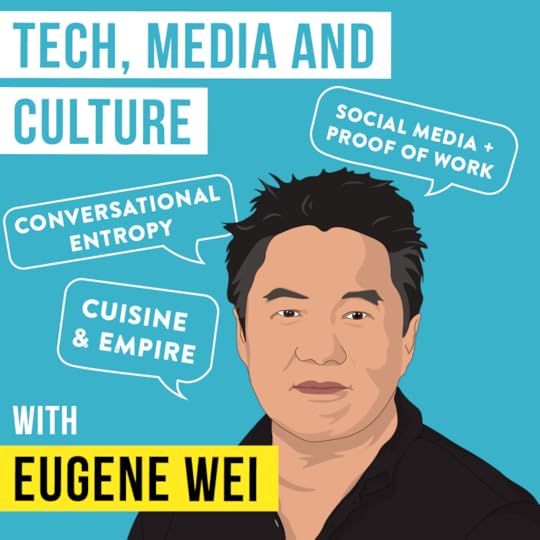
My guest this week, Eugene Wei, has one of the most
interesting backgrounds of anyone I’ve had on the podcast. He worked at Amazon
early in its life, was the head of product at Hulu and Flipboard, and head of
video and Oculus.
Our conversation is about the intersection of technology,
media, culture. We discuss Eugene’s concept of invisible asymptotes: why growth
slows down (for both companies and people) and how some can burst through. I’d
list more of the topics, but we covered so much that you should just listen.
Finally, I’ll say that after spending a day with Eugene
(including a wildly interesting dinner with Eugene, past podcast guest Sam
Hinkie, and future podcast guest Kevin Kwok) that he is the type of uniquely
interesting and kind person I am always searching for and one that I wish I
could bet on somehow. If you know more people like this, reach out and suggest
them for this podcast. Now, enjoy our conversation.
Show Notes
1:38 – (First Question) – Idea of cuisine and empire
1:52 – Cuisine
and Empire: Cooking in World History
4:20 – Key takeaways from the Defiant Ones Documentary
8;25 – Being convinced to buy a sports coat
11:10 – The concept of invisible asymptote
17:43 – How the medium shapes the messaging and the impact
of cameras everywhere on society
17:48– Invisible
asymptotes
17:56 – Selfies as a second language
22:57 – Proof of work in building a social network
32:51 – Magnification of inequalities in digital networks
34:01 – The
Lessons of History
36:47 – His thoughts on the media industry’s impact on
society as a whole
39:42 – His time at Hulu
44:48 – Places where video could replace text
47:30 – The need for media for any business looking to grow
49:35 – Amusing
Ourselves to Death: Public Discourse in the Age of Show Business
53:08 – Personal asymptotes
57:19 – Habit
building and goal setting
1:00:29 – Travel recommendations
1:03:24 – Movie recommendations
1:08:16 – Product recommendations and what makes them
indispensable
1:10:44 – Creation:
Life and How to Make It
1:13:23 – Thoughts on the art of conversation
1:14:59 – The
Most Human Human: What Artificial Intelligence Teaches Us About Being Alive
1:18:30 – Kindest thing anyone has done for Eugene
Learn More
For more episodes go to InvestorFieldGuide.com/podcast.
Sign up for the book club, where you’ll get a full investor
curriculum and then 3-4 suggestions every month at InvestorFieldGuide.com/bookclub
Follow Patrick on twitter at @patrick_oshag



